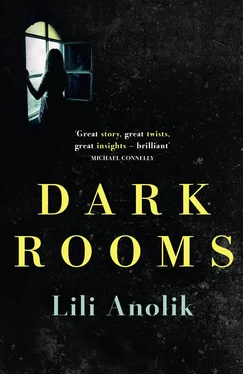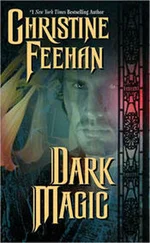“Come on, Nica, we’re still at school,” I said, peering around anxiously as she lit up.
She exhaled. “Relax. We’re alone. Want one?”
I made a scoffing noise, a show of waving away her minuscule smoke cloud. “Those things are going to kill you, you know.”
She considered what I’d said, then shrugged. “Like I want to live forever.”
She started laughing. And a second later, to my surprise, I did, too.
I woke up the next morning from a bad dream I couldn’t remember—there and gone, too fast to be pinned down—drenched in sweat, heart pounding. Immediately I was struck by the conviction that something was wrong.
Nica.
I threw off my blanket and ran across the hall, opening her door without knocking. The room was in its usual state of full-scale squalor: unclosed drawers, unclean laundry, undusted surfaces, uncapped pens, lip-gloss tubes, soda and nail-polish bottles. The comforter was pulled down on the bed, and I could see the ghost of Nica’s body imprinted on the sheets, the pillows flat and dented. The fleece I’d borrowed from her earlier in the week, returned yesterday, though, was still at the foot, neatly folded, label facing up, which meant she’d slept someplace else. Looking at it, I told myself what I was feeling was anger. If she got caught by Mom and Dad, she’d not only get herself in trouble, she’d get me in it, too, since I’d lied to cover for her.
I stood there for a minute, absently rotating my shoulder, limber after a night’s rest and pain-free, trying to think what to do next. My cell vibrated in my pocket. I whipped it out, hoping it was her. It wasn’t. Just the weather update I had sent to my phone hourly on game days. No missed calls either, so I called her. Voice mail picked up. At the beep I said, “Thanks a lot, Nica,” in a tone that was angrier than I felt, the anger from before, if anger was ever really what it was, having already dissipated, replaced by unease. But why, I wondered, unease? There wasn’t anything weird or out of character about Nica spending the night in a bed that wasn’t hers. She sneaked out all the time. Maybe then it wasn’t her I was uneasy about. Maybe I was uneasy because I was supposed to play an important match in a couple hours. Telling myself that must have been it—prematch jitters—I slipped a sweater on over my pajamas, headed downstairs.
The house was quiet, and my footfalls seemed to echo on the stairs. I could hear an appliance in the kitchen—the microwave, bleating plaintively because someone stuck something in it, forgot to take the something out. And then another sound—a tapping, faint. Not Dad. He’d be at Chandler, supervising morning detention. Not Mom, either. She’d be in her darkroom, working. Had already been there for hours, no doubt. Besides, this wasn’t her kind of noise. Too furtive, too cautious. There it was again. I stood, rigid, ears aching with the effort of listening. And then, suddenly, I realized: Nica, trying to attract my attention without attracting Mom’s. She wanted me to let her in. I flew down the last step and into the kitchen.
It was empty, no one behind the back door. On the other side of the window above the sink, though, was a slender rhododendron branch, knocking against the pane with the breeze. I stared at it, trying to remember if I’d seen Nica take her keys with her yesterday, until the microwave sounded again, and I reached for its handle. Sitting on the rotating glass tray was the bowl of Grape-Nuts and soy milk Mom ate most mornings. I started for the darkroom, about to duck my head in, tell her breakfast was ready. Then, anticipating the way her face would go hard and flat, the snap of her voice, if I interrupted her, broke her concentration, I stopped. I turned instead to the back door, thinking Nica might be outside, waiting until Mom went upstairs to shower.
But the backyard was as empty as the kitchen, not a soul. It was a beautiful morning, though, the sky a deep blue streaked with wispy white, the sun a rich, buttery yellow. I stood there, the rays gently pressing down on my skin, seeping into it, warming it, and breathed in the daffodil-scented air. Through an open window, the sounds of the Wheelers, our next-door neighbors, eating breakfast floated lazily toward me: the murmur of their voices, Mrs. Wheeler, pregnant, asking Mr. Wheeler to bring her her calcium supplements and a glass of orange juice; the soft scrape of a chair leg against tile; the suctiony pop of a refrigerator door; and then the jounce and slosh of a juice carton being shaken. I could hear the delicate wing beats of the sparrows, fighting for space on the perch of the bird feeder dangling from the yard’s lone tree. Somewhere far away, a car engine revved to life, and, beyond that, the dim drone of a lawn mower.
I started walking through the grass, its sweet-smelling wetness sticking to my ankles and feet, over to the fence at the far edge of the property. Our house was owned by the school, and though not quite on campus, very close to it, separated only by a graveyard and a line of trees. When the trees weren’t full, you could see clear across the graveyard to Endicott House, Jamie’s dorm. They were full now, though, so the view was obscured.
I slid between two posts and entered the tiny woods. As soon as I did, the sunlight and warmth and snatches of family dialogue fell behind me. Inside, everything was green and black and cool and dank, dark with the stench of dampness and shadow, of ferns and fungus. The scrub pines surrounding me had branches growing every which way, tangling together in a sooty snarl that blocked out the sky. Their bark looked mean, rotten, and when I touched it, it crumbled under my fingertips, dry as a scab. Something caught in my throat and I shivered. Wiping my hands on my pajama bottoms, I quickly began walking the thousand or so feet to the other side.
When I reached it, was standing at the edge of the graveyard, I made a scan of the horizon for Nica’s fast-moving form. Many a dawn would she slip out of Endicott in one of Jamie’s sweatshirts, the drawn hood concealing her hair and most of her face. Cutting through the rows of tombstones and markers, she’d steal in our back door, undetected, except by me, watching from my bedroom window. She and Jamie weren’t a couple anymore, but there was a better-than-even chance that the new guy, with whom she’d obviously spent the night, was also in Endicott. That or Minot, the other guys’ dorm.
I didn’t see Nica as I was hoping to, though. Instead, out of the corner of my eye, I saw a flash of movement or color. Only when I turned around, no one was there. Suddenly I noticed how quiet everything had become. Motionless, too, the leaves and trees perfectly still, not so much as a whisper of a breeze on the air. I closed my eyes. My ears filled with the beating of my heart, the in-outs of my breaths, the contraction of my throat muscles—sounds, I realized, that were always there but hidden, tucked away under every other sound—each shift, throb, flutter magnified, made significant, by the deep silence around me. And then a branch snapped and my eyes flew open. Pulling the old cardigan tight around my chest, I turned, started back to the fence.
That’s when I heard the police siren in the distance. It ripped into the morning, tearing it in two. For a moment I froze, transfixed. Then I began to run, but heavily, the way you do in nightmares, my limbs clumsy and strange, my feet sinking into the spongy earth, catching there, everything ground down and in slow-motion, and all at once I understood that I was in a nightmare: last night’s, the one I couldn’t remember but now, suddenly, in flashes, could. Still, I hauled my body along, through the trees, over the fence, toward what I knew—knew because it was there, all of it, in that piercing mechanical wail, knew because it was prophesied in my dream, as elusive as a scent, a shadow, a ghost, knew because it was written in the very blood flowing through my veins—would be as bad as it gets.
Читать дальше












